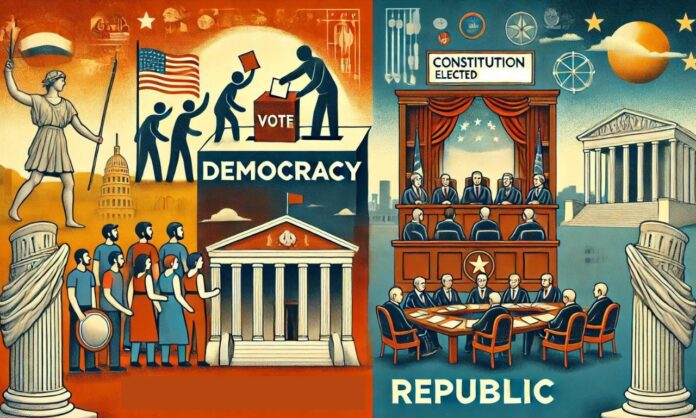When we talk about how countries are governed, we often hear the words “democracy” and “republic.” Although these terms are sometimes used interchangeably, they actually describe different systems of government. Let’s explore what each term means and how they differ in this, step-by-step article.
Table of Contents
1: Defining Democracy
What is Democracy?
Democracy is a form of government where the people hold power, either by making decisions directly or by electing representatives to act on their behalf. The key features of democracy include:
- Popular Sovereignty: The authority of the government is created and sustained by the consent of its people, through elected representatives.
- Majority Rule: Decisions are made based on the preference of the majority while respecting minority rights.
- Free and Fair Elections: Elections are conducted, with universal suffrage, ensuring that every eligible citizen has the right to vote.
Types of Democracy
- Direct Democracy: Citizens directly participate in decision-making processes. This form is rare in modern governance due to practical challenges.
- Representative Democracy: People choose representatives to make decisions on their behalf. This is the most common form of democracy today.
Advantages of Democracy
- Accountability: Leaders are accountable to the people and must seek reelection.
- Transparency: Decision-making processes are open, providing citizens with access to information.
- Protection of Rights: Democracies often include mechanisms to protect individual rights and freedoms.
2: Defining Republic
What is a Republic?
A republic is a form of government where the country is viewed as a public matter, not as the private concern or property of its leaders. The primary characteristics of a republic include:
- Rule of Law: The government operates under a set of laws that apply equally to all individuals, including leaders.
- Elected Representatives: Citizens elect representatives to govern on their behalf, often with a focus on protecting the rights of the individual.
- Constitutional Framework: Many republics operate under a constitution that limits the powers of government and defines the rights of citizens.
Variants of Republics
- Federal Republic: A federation of states with a republican form of government, such as the United States.
- Unitary Republic: A state governed as a single entity with a central authority, like France.
Advantages of a Republic
- Stability: The rule of law ensures a consistent and reliable political environment.
- Protection of Minority Rights: Constitutions often ensure protection against the tyranny of the majority.
- Balanced Power: Separation of powers among different branches of government prevents the concentration of power.
3: Key Differences
Governance
- Democracy: Focuses on majority rule and the direct participation of people in decision-making processes.
- Republic: Emphasizes the rule of law and the protection of individual rights, often with checks and balances to prevent the abuse of power.
Representation
- Democracy: This can involve direct participation by citizens (direct democracy) or electing representatives (representative democracy).
- Republic: Always involves elected representatives who are bound by a constitution or set of laws.
Rights Protection
- Democracy: Majority rule can sometimes lead to the oppression of minority groups if safeguards are not in place.
- Republic: Aims to protect individual rights and minority interests through a constitution and legal framework.
4: Examples
Democracy in Practice
- India: A representative democracy with a parliamentary system, where citizens elect representatives to both national and state legislatures.
Republic in Practice
- United States: A federal republic where the Constitution establishes the framework for governance, protecting individual rights and balancing powers across branches of government.
5: Conclusion
Understanding the differences between a democracy and a republic helps clarify the nature of political systems around the world. While both emphasize the importance of the people in governance, they differ in their approaches to representation, protection of rights, and the rule of law. Democracies prioritize majority rule and broad participation, while republics focus on the rule of law and protecting individual rights within a structured constitutional framework.

